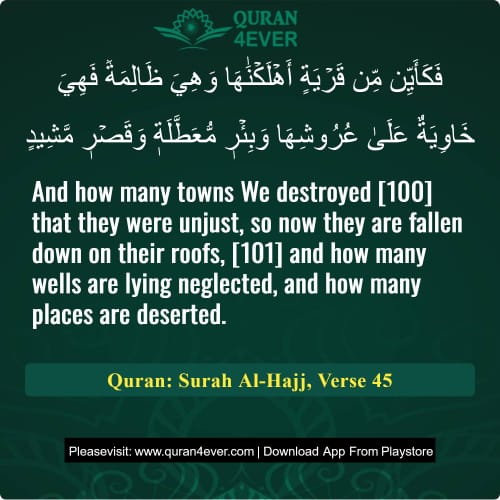
Transliteration:( Faka ayyim min qaryatin ahlaknaahaa wa hiya zaalimatun fahiya khaawiyatun 'alaa 'urooshihaa wa bi'rim mu'at talatinw wa qasrim masheed )
"And how many towns We destroyed [100] that they were unjust, so now they are fallen down on their roofs, [101] and how many wells are lying neglected, and how many places are deserted."
This verse highlights that entire civilizations were destroyed due to their injustice and disobedience.
Divine punishment did not just affect the guilty humans — even animals and other creations in those towns perished.
Allah states elsewhere: "Mischief has appeared in the land and sea because of what the hands of men have earned." (Surah Ar-Rum: 41)
From this, we learn:
When man fails in his role as the central figure of creation, the rest of creation loses its purpose.
The destruction of such towns serves as a warning to future generations.
The towns became so utterly ruined that they collapsed inward, roofs falling first.
These ruins still existed at the time of revelation, and the Quraysh passed by them in their travels, yet failed to take heed.
Similarly, neglected wells and abandoned palaces once filled with life became symbols of divine retribution.
This verse urges reflection — that material progress or strength is not a shield against divine justice.
The tafsir of Surah Al-Hajj verse 45 by Ibn Kathir is unavailable here.
Please refer to Surah Hajj ayat 42 which provides the complete commentary from verse 42 through 46.
(22:45) How many towns have We destroyed because their people were steeped in iniquity:[90] so they lie fallen down upon their turrets! How many wells lie deserted; and how many towering palaces lie in ruins!
90. In Arabic a well is synonymous with a habitation. Thus “many a wells” means “many a habitation has been destroyed”.
[930]- Literally, "fallen in upon its roofs," i.e., after the roofs of its buildings had caved in, the walls collapsed over them. [931]- i.e., How many wells have been left inoperative, and how many palaces have been emptied of their occupants in the past.

For a faster and smoother experience,
install our mobile app now.
Related Ayat(Verses)/Topics